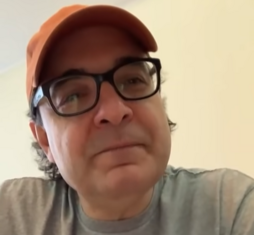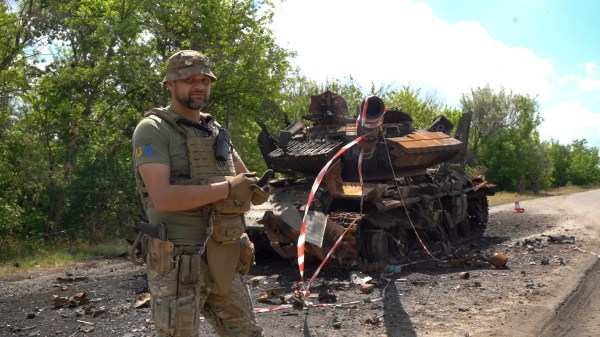In response to criticism from Western leaders and media outlets for the death of Alexei Navalny in Russian custody, pro-Kremlin actors—including the Russian Foreign Ministry itself—have drawn comparisons to the recent death of American journalist Gonzalo Lira in a Ukrainian prison.
“It’s interesting why, for the White House and the State Department, the death of a Russian citizen in a Russian correctional facility turned out to be much more important and seemed more terrible than the death of an American citizen, journalist Gonzalo Lira, tortured in a Ukrainian prison?” the Russian Foreign Ministry said in a post on Telegram, translated from Russian by The Dispatch Fact Check. “Instead of rash accusations, it would be appropriate to show restraint and await the official results of the forensic examination.”
Like the death of Navalny, the circumstances surrounding Lira’s death remain murky. While exact details related to the American journalist’s death are scarce, below is an overview of what we do know.
Who was Gonzalo Lira?
Lira, a writer and filmmaker raised in California, gained attention after the Russian invasion of Ukraine. According to a March 2022 profile in the Daily Beast, Lira was a “manosphere” YouTuber who went by the name Coach Red Pill and offered viewers relationship advice—including “never date a woman in her thirties”—prior to pitching himself as an unbiased journalist with insight into the war in Ukraine. Once the war began, Lira—who at the time resided in Kharkiv, the second-largest city in Ukraine—quickly began posting content supportive of Russia and questioning mainstream media coverage of the conflict.
Why was Lira imprisoned?
On May 1, 2023, Lira was arrested at his home by Ukraine’s security service for charges related to Article 436-2 of Ukraine’s criminal code, which restricts the justification, glorification, recognition as lawful, and denial of Russia’s armed aggression against Ukraine. “It covers a variety of things,” Dmytro Vovk, a professor of law at Yaroslav Mudryi National Law University in Kharkiv, Ukraine, told The Dispatch Fact Check. “For example, the justification of the occupation, denial of the occupation or acts of aggression, and any justification that the Russian military or government is in the right.” According to Vovk, the Verkhovna Rada—Ukraine’s parliamentary body—passed an amendment to the country’s criminal code implementing Article 436-2 in March 2022, shortly after Russia’s invasion.
Lira’s case quickly rose to prominence among the American public after both Tucker Carlson and Elon Musk began rallying to his defense.
An investigation by Ukraine’s security service determined that Lira had justified the Russian invasion by claiming that a neo-Nazi regime ruled Ukraine and denied that Russian forces had murdered Ukrainian civilians—both violations of Article 436-2. “My crime was making videos critical of the West and their proxy regime in Kiev—and how they are destroying Ukraine,” Lira said following his arrest. “My indictment explicitly states that all I did was discuss publicly known facts about the war—the epitome of free speech in a democracy. But Zelensky’s Ukraine is no democracy—it is a thieving, corrupt, murderous gangster regime PRETENDING to be a polite ‘western’ democracy.” Lira was initially released after posting bail, but was detained again in August after violating his bail conditions by attempting to flee the country.
According to Vovk, in the majority of the approximately 500 cases involving Article 436-2, prosecutors reach some form of a plea bargain with the accused individual that results in the individual being sentenced to probation—meaning they do not actually spend time in prison.
Though Ukrainian President Volodymyr Zelensky declared martial law in February 2022—enabling his government to restrict certain freedoms—Article 436-2 is itself independent of martial law. “It will be in force until it is revoked by the Parliament,” Vovk explained. “If martial law is canceled, an individual still can be prosecuted for justifying the Russian aggression against Ukraine.”
While Vovk understands how such a restriction on speech could appear problematic to some in the West, he does not believe it is fair to hold Ukraine to the same expectations as a stable peacetime democracy. “I encourage you not to compare limitations on freedom of expression in current Ukraine with limitations of freedom of speech in the current United States,” he said. Instead, Vovk explained, Ukraine’s restrictions should be compared to those of countries like the United States and United Kingdom during similar periods of conflict. The Sedition Act of 1918, for example, outlawed many forms of dissenting speech against the U.S. government and its war effort. Similarly, the 1940 Smith Act, passed a year-and-a-half prior to direct U.S. involvement in World War II, outlawed a broad range of subversive activities against the government.
What do we know about Lira’s death?
On February 12, 2024, Lira’s father revealed that Lira had died at the age of 55 while in Ukrainian custody, with confirmation coming from the U.S. Department of State three days later. A letter given by Lira’s father to the far-left website Grayzone claimed that Lira had been suffering from pneumonia and was supposed to undergo a procedure to reduce edema pressure in his lungs. Lira also claimed that Ukrainian officials were negligent in addressing his worsening health, and Lira’s father has placed blame on both the U.S. and Ukraine. “I cannot accept the way my son has died. He was tortured, extorted, incommunicado for 8 months and 11 days and the US Embassy did nothing to help my son,” Lira’s father said in an email provided to Grayzone. “The responsibility of this tragedy is [with] the dictator Zelensky with the concurrence of a senile American President, Joe Biden.” Neither American nor Ukrainian officials have provided any additional information on Lira’s condition leading up to his death or measures taken to address any illness, with the State Department simply offering its “sincerest condolences to the family on their loss.”
If you have a claim you would like to see us fact check, please send us an email at factcheck@thedispatch.com. If you would like to suggest a correction to this piece or any other Dispatch article, please email corrections@thedispatch.com.









Please note that we at The Dispatch hold ourselves, our work, and our commenters to a higher standard than other places on the internet. We welcome comments that foster genuine debate or discussion—including comments critical of us or our work—but responses that include ad hominem attacks on fellow Dispatch members or are intended to stoke fear and anger may be moderated.